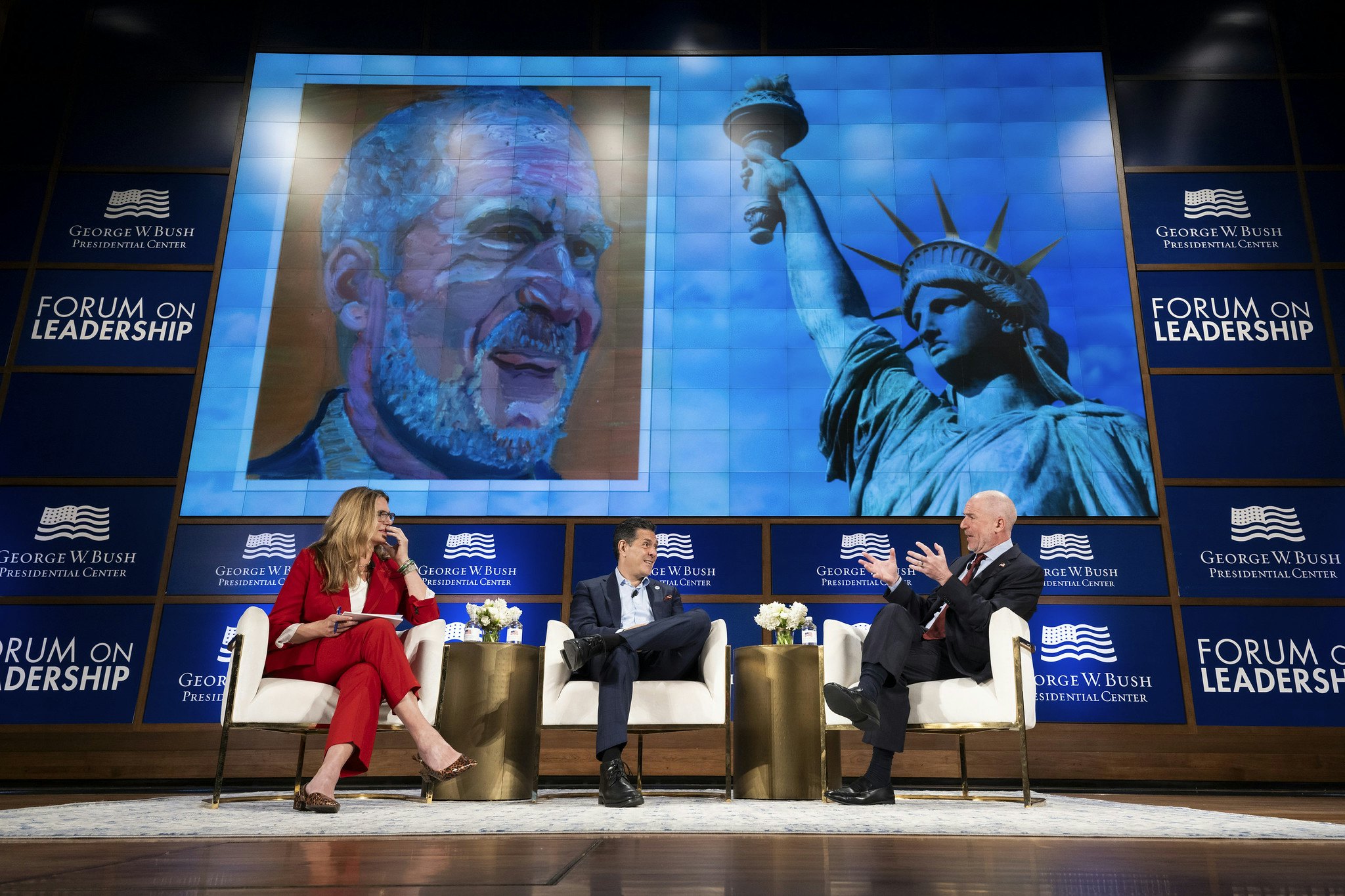Our Recommendations:
- The Trump Administration and Congress should relaunch multilateral and bilateral negotiations to reduce international trade barriers, rather than imposing additional tariff increases
- The administration should pursue targeted measures to reduce U.S. dependence on China for goods essential to national security
- Congress should raise federal investment in science and technology research to at least 1% of U.S. GDP
- Congress and the administration should only pursue industrial policies targeting individual companies when they operate in industries vital to national security or emerging industries with large spillovers to other strategic industries
- Congress and the administration should implement policies that directly improve the well-being of all working Americans, without regard for the industry they work in
Federal policies toward international trade and domestic manufacturing play significant roles in shaping the opportunities available to working Americans. The new administration and Congress should embrace the core policy framework that has enabled America to outperform all other advanced economies since World War II: democratic capitalism secured by the rule of law; U.S. leadership in science, technology, and education; and rules based fair and open trade around the world.
The Trump Administration and Congress should pursue targeted policies to ensure national security and reduce risks from dependence on China and other potential strategic adversaries. And they should advance policies that expand economic opportunity and wellbeing for all working Americans regardless of industry.
President Donald Trump proposes raising tariff rates to 60% or more on imports from China and 20% on imports from all other countries. The full plan would raise average tariffs on imported goods to about 17%, according to analysis by the nonpartisan Tax Foundation. To put this figure in perspective, average tariffs were approximately 20% under the Smoot- Hawley Tariff of 1930, which many economists believe contributed to the Great Depression.
Average tariff rates fell to an all-time low of 1% during the George W. Bush Administration, then roughly doubled to just over 2% as a result of executive orders issued during the first Trump Administration and renewed by the Biden Administration. President Trump has recently announced plans to impose new tariffs on Canada, Mexico, and other countries on his first day in office.
The Biden Administration’s embrace of state-directed industrial policy through the CHIPS and Science Act, the Inflation Reduction Act (IRA), and the Bipartisan Infrastructure Act represented a sharp departure from federal policies for at least the last 30 years. But the Biden Administration has yet to release most of the $1 trillion-plus in subsidies and tax credits for domestic semiconductor and green-tech manufacturing authorized under these acts, so the new administration faces immediate industrial policy decisions.
The United States has historically had little success picking winners and losers among private-sector manufacturing firms. But America has been very successful at advancing technological progress, productivity growth, and worker incomes across the economy through federal investments in science, technology, and education. In today’s fast changing, knowledge-centric economy, U.S. leadership in these domains is more vital than ever.
The administration should pursue targeted measures to reduce U.S. dependence on China for goods essential to national security
The incoming administration’s tariff plan would effectively raise taxes borne by American consumers by about $2,250 to $3,000 per household, based on the Tax Foundation’s estimates. The tariff plan would reduce U.S. exports to other countries for three reasons: It would reduce the dollars available to foreign countries to pay for U.S.-made goods; invite retaliation by foreign governments; and shift scarce labor and resources away from industries in which the United States is a net exporter to industries in which it is currently a net importer.
Tariffs are a poorly targeted way to help working people because the higher costs of foreign goods – which can range from produce to electronics to oil and gas – are passed on to consumers. Tariffs redistribute income to companies focused on the domestic market and ultimately to their workers and shareholders. But history teaches that protecting mature companies behind tariff walls makes them less innovative and productive over time.Tariffs also lock resources into place that would otherwise find their way to more dynamic, growing companies.
Moving workers from export-focused industries to less efficient import-company industries would likely lower their earnings. One example: In six manufacturing-intensive Pennsylvania counties, workers in industries in which America is a net importer – like steel and aluminum products, auto parts, and industrial machinery – earn some 25% less than workers in top exporting industries – like pharmaceuticals, medical devices, and navigation and control instruments – based on a George W. Bush Institute-SMU Economic Growth Initiative analysis of Bureau of Labor Statistics data.
Congress should pass a Trade Promotion Authority (TPA) measure empowering the administration to pursue reciprocal reductions in trade barriers with friendly foreign nations – the last such provision expired in 2021 – and the administration should use this authority to pursue lower barriers to U.S. exports. While the average tariff rate facing U.S. exporters is below 4% in most countries, nontariff restrictions in many countries create barriers equivalent to 40% tariffs on American-made goods, significantly harming Americans working in export industries.
The Trump Administration and Congress should relaunch multilateral and bilateral negotiations to reduce international trade barriers, rather than imposing additional tariff increases
The United States depends on imports for 95% of its supply of rare earth materials essential to many defense technologies, with most of this supply coming from China. In December 2024, the Chinese government announced new restrictions on exports of rare earth products to the United States.
The United States is also heavily dependent on Taiwan, which accounts for 68% of the world’s production of advanced semiconductors, making America and its allies vulnerable to Chinese coercion for products that are indispensable to U.S. national security. The United States produces just 12% of global advanced semiconductor supply. The administration should pursue trade and industrial policies aimed at far greater reliance on producers in the United States and allied nations for these and other products vital to U.S. defense production. It should also coordinate with allies to impose further restrictions on exports of national security-sensitive technologies like advanced semiconductor manufacturing equipment to China.
The new administration should release remaining funds targeting domestic advanced semiconductor manufacturing under the CHIPS Act, since the industry has launched more than 80 projects across 25 states with private-sector investment of more than $400 billion premised on CHIPS Act subsidies.
Congress should raise federal investment in science and technology research to at least 1% of U.S. GDP
U.S. leadership in science and technology is one of the core foundations of prosperity and opportunity in the United States today. But federal investment in research and development has fallen as a share of the economy for several decades and now stands at only 0.7% of GDP, down from 1.0% as recently as 2010.
The United States has dominated global science and technology research since World War II because it built the best model for nation-scale innovation the world has ever seen, a vital component of which is federal funding at levels far exceeding those of any other nation as a share of the economy. America’s research and development model has given rise to dominant market positions in many high-paying industries: software, defense technology, space exploration, financial technology, medical devices, biotechnology, and more. Recommitting to U.S. preeminence in science and technology is the single best step Congress can take to generate rising living standards and wider opportunity in coming decades.
Congress and the administration should only pursue industrial policies targeting individual companies when they operate in industries vital to national security or emerging industries with large spillovers to other strategic industries
Industrial policies that subsidize specific firms to manufacture in the United States promote cronyism, inefficiency, and waste. East Asian countries often cited as industrial policy success stories – notably Japan and South Korea – employed such policies primarily when they were relatively low-income economies aiming for rapid catchup to the industrial West. They have since relied less on state-directed subsidy policies as the downsides have come to outweigh the benefits. America should restrict firm-specific industrial policies to industries vital to national security or in which domestic production significantly enhances U.S. productivity in many other related sectors. Two industries that meet both conditions are advanced semiconductors and artificial intelligence. Most other industries meet neither.
Congress and the administration should scale back the unspent subsidies for green-tech manufacturing passed over the last four years in the interest of fiscal discipline, since these policies have little national security rationale. Congress should support U.S. leadership in AI through light-touch regulation targeting specific potential harms and through ordinary defense procurement rather than through broader industrial policies.
Congress and the administration should implement policies that directly improve the wellbeing of all working Americans, without regard for the industry they work in
Policymakers should increase support for education and skills-building, particularly by making Pell Grants more widely available for trade schools. They should expand the earned income tax credit and other provisions that increase working people’s earnings and consider raising subsidies for child care services.
One of the best ways Congress can improve the well-being of working Americans, moreover, is to curtail inflationary overspending and put the national debt on a sustainable long-term trajectory. These policies would make all working people better off in the long run, rather than simply transferring income to some working Americans from others through counterproductive tariffs and industrial policies.
Creating well-paying jobs in growing, world-leading industries remains the best way to expand opportunity for working Americans. The United States has long outperformed all other nations in creating such jobs, based on America’s winning formula of democratic capitalism at home; global preeminence in science, technology, and education; and rules-based fair and open trade around the world. Federal policymakers should supplement this formula with measures that further increase the economic well-being of all working Americans, not protect and subsidize inefficient industries at the expense of everyone else. And they should redouble their focus on economic policies that directly advance America’s national security.































